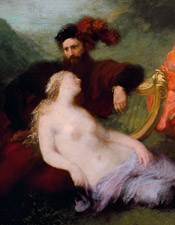Tannhäuser
, translated by Dyer, Abigail (dyerabigail@gmail.com)
Tannhäuser, an opera composed by Richard Wagner, premiered in Dresden in 1845. It combines elements of German Romantic opera and French Grand Opera, focusing on the mythological figure Tannhäuser and the Wartburg Song Contest. The story explores themes of sacred versus profane love and redemption. Wagner revised the opera several times, notably for the 1861 Paris version.
The plot follows Tannhäuser, a knight and minstrel, who has spent time in the realm of Venus, the goddess of love. He eventually becomes disillusioned with the sensual life there and seeks redemption through Christian faith. Returning to his home, he enters a singing contest at the Wartburg castle, where he shocks the court by praising the pleasures of Venus. His love for Elisabeth, a virtuous woman, complicates his internal struggle. After being banished, he goes on a pilgrimage to Rome seeking absolution, but is denied forgiveness by the pope. In the end, Elisabeth prays for him and dies, leading to Tannhäuser’s redemption through her love.
The Dresden version (1845) is the original production. After the initial performances, Wagner made minor revisions, primarily to clarify certain scenes. This version remained in use for performances across Europe.
The Paris version (1861) was a major revision commissioned by Napoleon III for the Paris Opéra. In line with the house’s tradition, Wagner added a ballet to the first act and made several other significant changes. The role of Venus was adjusted from soprano to mezzo-soprano, and some musical elements were revised or removed. The premiere faced disruptions, particularly from the aristocratic Jockey Club, who were annoyed that the ballet's placement in the first act required them to attend from the start, interfering with their usual dinner schedule. After just three performances, Wagner withdrew the opera.

Dyer, Abigail
Support Open-Access:
Your contribution keeps our classical translations available to all. Every dollar helps support classics education and funds the expansion of our catalogue. Value what we do? Donate now.
File Downloads:
© Copyright, All Rights Reserved. This work may be freely reproduced, stored and transmitted, electronically or otherwise, for any non-commercial purpose. Conditions and Exceptions apply.